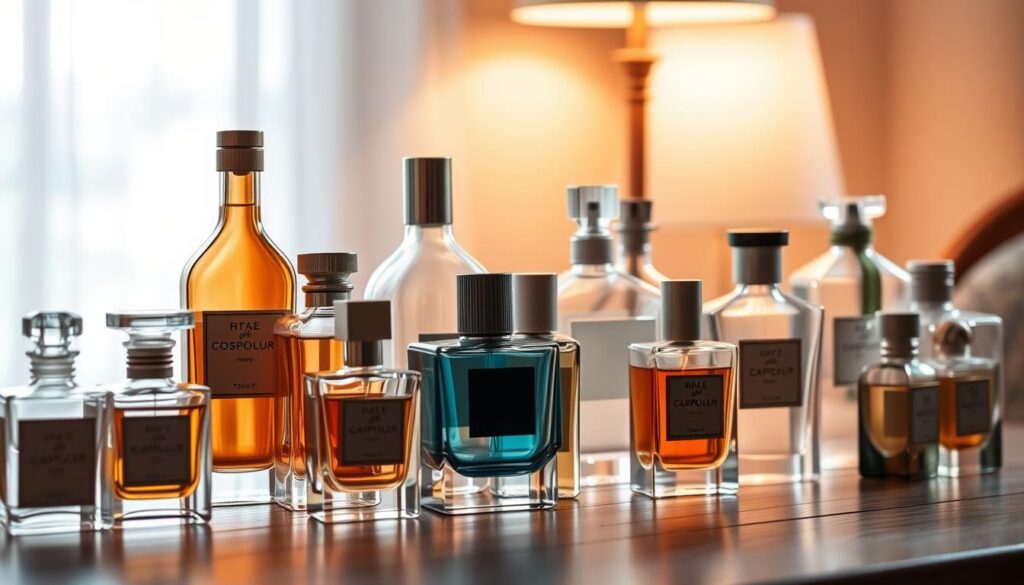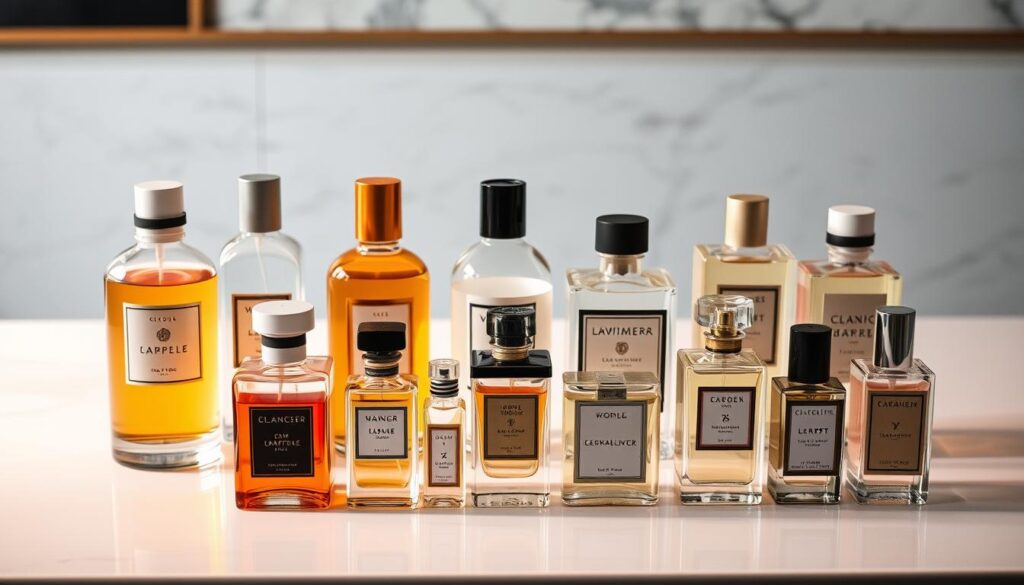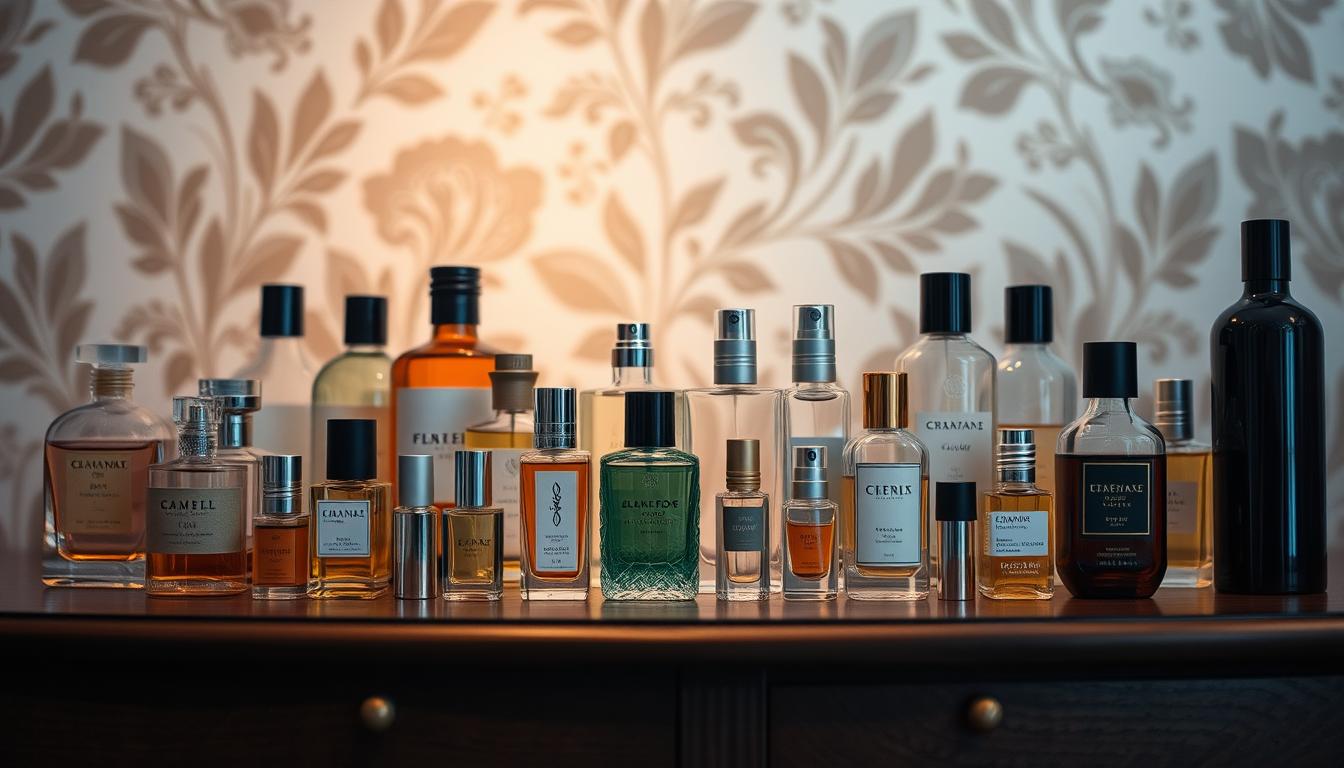https://youtu.be/gNhJNuMlB_Q
Sarah walked into a fancy perfume shop, overwhelmed by all the bottles. She wanted a scent that showed who she was but didn’t know where to start. Many beginners feel the same way when picking a perfume.
Finding the perfect perfume is more than just liking a smell. It’s about finding a scent that shows off your personality. Our guide will show you how to pick a perfume that makes you feel confident and authentic to yourself.
Perfume is like a silent message that says a lot before you even speak. With 90% of perfume buyers saying personal taste is key, finding your signature scent is a fun journey of self-discovery.
Key Takeaways
- Understand your personal style and fragrance preferences
- Test fragrances directly on your skin for accurate results
- Consider your body chemistry when selecting a perfume
- Explore different fragrance families to find your match
- Remember that confidence is the best accessory with any scent
Understanding Perfume Basics and Composition
Perfumes are a mix of science and art. They tell a story through scent notes and ingredients. These elements come together to create a memorable smell.
Fragrances have layers that work together. This creates a complex smell experience. Let’s dive into how these elements combine.
The Three Layers of Fragrance Notes
Perfume notes are divided into three main layers. Each layer is important for the scent:
- Top Notes: The first smell (5-15 minutes)
- Heart Notes: The main scent (20-60 minutes)
- Base Notes: The lasting smell (4-12 hours)
Different Types of Perfume Concentrations
| Perfume Type | Fragrance Oil Concentration | Typical Longevity |
|---|---|---|
| Eau de Cologne | 2-4% | 1-2 hours |
| Eau de Toilette | 5-15% | 2-3 hours |
| Eau de Parfum | 15-20% | 4-5 hours |
| Extrait de Parfum | 20-30% | 6-8 hours |
Natural vs Synthetic Ingredients
Natural and synthetic ingredients shape a perfume’s character. Natural scents are authentic, while synthetic ones offer consistency and creativity.
- Natural ingredients: Come from plants, flowers, and more
- Synthetic ingredients: Made to mimic or enhance natural smells
- Synthetic ingredients help make perfumes consistent and affordable
Knowing about perfume composition helps you choose better. It lets you appreciate the art in each fragrance.
How To Choose Perfume, Beginners, Smell Amazing

Exploring fragrances can be daunting, even for newcomers to perfume shopping. With the perfume market growing in 2024, picking the right scent is key.
When looking for your favorite perfume, keep these points in mind:
- Identify your favorite scent families
- Understand your body chemistry
- Test fragrances on your skin
- Consider the occasion and time of day
For beginners, gourmand and floral scents are great choices. About 40% of new users like sweet, edible smells. These fragrances are a gentle way to start your perfume journey.
Your perfume should match your personality and lifestyle. Try different fragrance concentrations to find what suits you best. Eau de parfum lasts up to 6 hours, perfect for those who want a scent that lasts.
Pro tip: Always test fragrances on your skin and let them settle for at least 30 minutes. This way, you see how the scent works with your body. It ensures you pick a perfume that truly feels like you.
Exploring Fragrance Families and Their Characteristics
Perfume lovers know finding the right fragrance families is like discovering a personal signature. Our journey through scents reveals unique landscapes that show our personalities and feelings.

The world of perfumery is full of diverse scents that take us to different places. Knowing these fragrance families helps us choose scents that match our preferences.
Floral and Fresh Fragrances
Floral scents are the most loved, making up 75% of women’s perfume choices. These scents bring the smell of blooming gardens and spring mornings. They are known for:
- Soft, romantic notes
- Light and airy compositions
- Predominantly feminine appeal
Woody and Oriental Perfumes
Woody fragrances offer a deep and complex scent experience. Oriental perfumes add warmth and depth to your scent. These strong scents are for those who want a sophisticated and lasting aroma.
Citrus and Aromatic Notes
Citrus fragrances give a fresh and lively feeling. These bright, zesty scents are great for those who love crisp, energetic smells that wake up the senses.
Remember, your perfect fragrance is a journey of self-discovery!
Whether you like delicate floral notes or robust woody undertones, knowing these fragrance families helps you find a scent that shows your unique personality.
Understanding Your Body Chemistry and Perfume Interaction

Every person’s skin is unique, making it a fascinating canvas for fragrance. Your body chemistry greatly affects how a perfume smells and lasts. Skin type, pH levels, and natural body odor can change a fragrance’s character.
Knowing how skin types affect scents is key. For example:
- Oily skin keeps fragrances longer
- Dry skin absorbs scents faster
- Melanin levels change how a perfume develops
Sillage, or the perfume trail, varies with body chemistry. Some people make fragrances stronger, while others make them softer. This means a perfume can smell different on everyone.
Your skin’s pH level affects how fragrances perform. Acidic skin might make certain notes more pronounced, while alkaline skin changes a perfume’s character. Keeping your skin moisturized helps fragrances last longer and bind better.
To get the most out of your perfume, try these tips:
- Test fragrances directly on your skin
- Wait at least 30 minutes to see full scent development
- Notice how the fragrance changes throughout the day
Matching Perfume to Your Personality Type
Finding your perfect signature scent is more than just picking a nice smell. It’s about finding a fragrance that matches your inner self. Our guide will show you how to find a scent that reflects your unique character.
Every personality type has a special fragrance that fits their natural vibe and style. By understanding these connections, you can pick a perfume that truly represents who you are.
Fresh and Sparkling Personalities
People with lively, energetic personalities do best with light and crisp fragrances. They usually have:
- Citrus-based scents
- Aquatic and marine notes
- Green and herbal undertones
Reviews show that fresh personalities love scents that feel spontaneous and light.
Warm and Earthy Characters
Those with calm, nurturing personalities often choose fragrances that feel comforting and deep:
- Woody and sandalwood notes
- Warm vanilla undertones
- Subtle musk accents
These scents show a connection to nature and a stable, calm personality.
Passionate and Fiery Temperaments
For those with strong, passionate personalities, bold and provocative fragrances are perfect:
- Spicy oriental scents
- Rich amber and incense notes
- Deep, complex fragrance profiles
Perfume lovers with fiery temperaments pick scents that match their bold and emotional nature.
The right fragrance is a personal statement that tells your unique story.
Seasonal Perfume Selection Guide
Choosing the right scents for each season can change how you smell all year. Our perfume guide shows you how to pick the best Eau de parfum and eau de toilette for every time of year.

As the weather changes, so should your scent. In summer, go for scents that are light and refreshing. These should remind you of sunny days.
- Spring: Light floral and green fragrances
- Summer: Citrus and aquatic notes
- Fall: Warm woody and spicy scents
- Winter: Rich, deep oriental fragrances
In autumn, switch to deeper scents with woody and spicy notes. These are great for the cooler weather and evening gatherings.
| Season | Recommended Fragrance Type | Concentration |
|---|---|---|
| Spring | Fresh Florals | Eau de Toilette (5-15%) |
| Summer | Citrus & Aquatic | Light Eau de Toilette |
| Fall | Woody & Spicy | Eau de Parfum (15-20%) |
| Winter | Oriental & Musky | Concentrated Eau de Parfum |
Knowing your skin type and the scent strength is key to picking the right scents. Remember, the right perfume can be your invisible accessory, adding to your style and the season.
Testing and Sampling Fragrances Properly
Perfume testing is an art that needs patience and careful steps. Before buying a full bottle, it’s key to know how to sample fragrances well. Our guide will show you how to handle fragrance samples with confidence.
The Right Way to Test Perfumes
When you’re testing scents, remember that paper strips only show part of a fragrance’s true nature. Experts say to test perfumes on your skin to see how they mix with your body’s chemistry.
- Apply perfume to your inner wrist or elbow
- Wait 10-15 minutes to see how the scent changes
- Avoid rubbing the area where you applied the perfume
- Test only 2-3 fragrances at a time
Common Testing Mistakes to Avoid
Knowing how to sample fragrances means knowing what not to do. Many people make big mistakes that can mess up their perfume choice.
“Your first impression of a fragrance rarely tells the complete story.”
- Don’t test more than three fragrances in one day
- Avoid testing on clothing – skin interaction is key
- Never rub perfume into your skin
- Test fragrances when your sense of smell is sharpest (morning)
Perfume testing needs patience and a methodical approach. By following these tips, you’ll make better choices and find scents that match your style.
Perfume Application Tips and Techniques
Learning how to apply perfume is an art. It can make your fragrance last longer and smell better. Knowing the right ways to apply perfume can change how you smell from good to great.
Where you apply perfume is important. Experts say to use pulse points that get warm. This helps spread the scent:
- Wrists
- Neck
- Behind the ears
- Inside elbows
- Behind the knees
To get the most out of your perfume, start with moisturized skin. Hydrated skin keeps the scent longer and makes it smell better for longer.
Perfumers warn against mistakes that can ruin your scent. Don’t rub your wrists after applying perfume. This can damage the perfume’s molecules. Instead, dab gently or let it dry on its own.
How you apply perfume changes with the type. Eau de parfum needs just one spritz. Eau de toilette might need two or three. Your body’s chemistry affects how you smell.
Pro tip: Apply perfume to clean, moisturized skin for the best fragrance experience.
Using these perfume application tips will make your scent memorable and last longer. It will also match your personal style.
Making Your Fragrance Last Longer
Perfume lovers know that making scents last is an art. Learning how to keep your favorite smells alive can change how you enjoy perfume. We’ll share tips to keep your perfume fresh and exciting all day long.
Perfume Storage Secrets
Storing perfume right is key to keeping its scent strong. Here’s what we suggest:
- Keep perfumes in cool, dark places away from sunlight
- Keep the temperature between 55-72°F
- Don’t store perfume in bathrooms because of the humidity
- Always keep the bottle closed when not using it
Strategic Application Techniques
Here are expert ways to make your perfume last longer:
- Apply perfume to clean, moisturized skin
- Put it on pulse points for the best scent spread
- Don’t rub your wrists after spraying
- Use matching body products for a stronger scent
| Perfume Type | Concentration | Average Longevity |
|---|---|---|
| Parfum | 20-30% | 6-8 hours |
| Eau de Parfum | 15-20% | 4-5 hours |
| Eau de Toilette | 5-15% | 3-4 hours |
Remember, your body’s chemistry affects how perfume smells and lasts. By knowing this, you can get the most out of your favorite perfumes.
Building Your Signature Scent Collection
Creating a fragrance wardrobe is like curating a personal art collection. Each perfume tells a unique story about your personality and mood. Your signature scent isn’t just a fragrance – it’s an extension of your identity.
To build a versatile perfume collection, consider exploring different fragrance families:
- Floral fragrances for romantic moments
- Woody scents for confident days
- Fresh notes for energetic mornings
- Oriental perfumes for evening elegance
Start by selecting 3-4 core fragrances that represent different aspects of your personality. Some tips for developing your fragrance wardrobe:
- Choose scents for different occasions
- Experiment with sample sets
- Test fragrances on your skin
- Consider seasonal variations
Pro tip: Your signature scent should make you feel confident and authentic. Don’t rush the selection process – finding the perfect perfume can take time. Many professional perfume enthusiasts recommend dedicating weeks or even months to discovering your ideal fragrance combination.
Remember, a well-curated perfume collection reflects your personal journey and evolving style. Embrace the exploration and enjoy creating a scent wardrobe that is uniquely yours.
Conclusion
Choosing the perfect perfume is an exciting adventure for beginners. Our guide has explored how to choose perfume that truly reflects your personality and helps you smell amazing. We’ve discovered that fragrance selection is deeply personal, with 90% of wearers believing their scent represents their individual confidence.
Understanding fragrance families and body chemistry transforms perfume shopping from a challenge into a delightful exploration. Whether you’re drawn to floral, woody, fresh, or oriental scents, the key is finding a fragrance that resonates with your unique spirit. Remember that 55% of consumers often follow trends, but your personal preference matters most.
We encourage you to experiment fearlessly. Test different fragrances, understand their notes, and pay attention to how they interact with your skin. Don’t be discouraged if the first few attempts aren’t perfect. Perfume is an art of self-expression, and discovering your signature scent is a journey of joy and discovery.
As you move forward, trust your instincts and embrace the fragrances that make you feel confident and authentic. Your perfect scent is out there, waiting to tell your unique story.
FAQ
How many perfume notes are there, and what do they mean?
Perfumes have three main layers: top, heart, and base notes. Top notes are the first scents you smell, usually light and fresh. After 10-15 minutes, heart notes emerge, making up the fragrance’s core. Base notes are the deepest scents that last the longest, forming the perfume’s foundation.
What’s the difference between eau de toilette and eau de parfum?
Eau de toilette has less fragrance oil (5-15%) and is lighter. Eau de parfum has more fragrance oil (15-20%), lasting longer and being more intense. This makes eau de parfum better for all-day wear.
How can I make my perfume last longer?
To make your perfume last, moisturize your skin first. Apply to pulse points like wrists and neck. Avoid rubbing the fragrance. Store perfumes in a cool, dark place. Using scented body products can also help layer the fragrance.
How do I choose a perfume that suits my personality?
Think about your style, lifestyle, and character. Light, citrusy scents suit fresh personalities. Bold, oriental fragrances are for passionate individuals. Woody or spicy notes are for those with a warm character. Choose a scent that makes you feel confident and reflects your essence.
What are the main fragrance families?
Fragrance families include Floral, Fresh, Woody, Oriental, Citrus, and Aromatic. Each family has unique characteristics. They can match different personalities and occasions.
How should I test a new perfume?
Always test perfumes on your skin, not just on scent strips. Spray a small amount on your wrist and wait 30 minutes. Avoid testing too many at once and don’t rub the area, as it can change the scent.
Can body chemistry affect how a perfume smells?
Yes, it can! Skin pH, diet, hormones, and natural odor can change how a fragrance smells on you. What smells great on one person might smell different on another. Always test perfumes on your skin before buying.
How many perfumes should I have in my collection?
It’s good to have 3-4 fragrances for different times and seasons. Have a light scent for daytime and a stronger one for evenings. Consider a seasonal scent for summer and winter, and a signature scent that shows your style.
https://www.youtube.com/watch?v=XHOmBV4js_E




